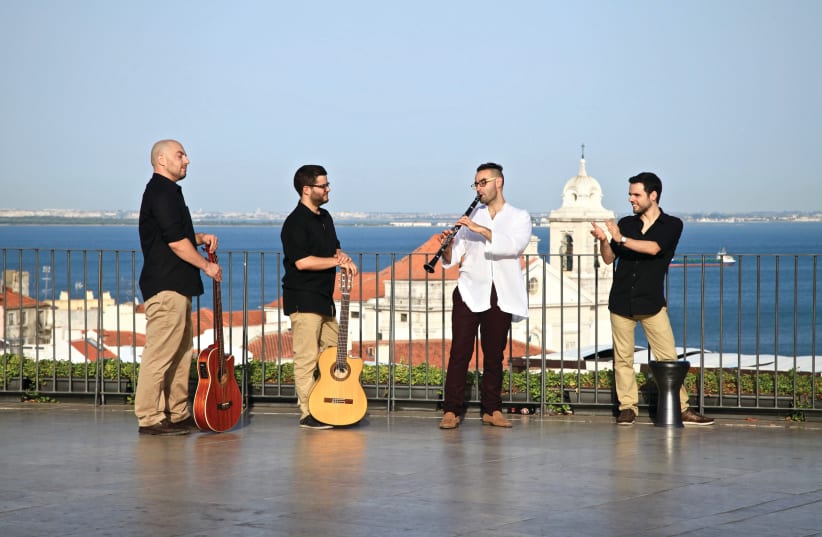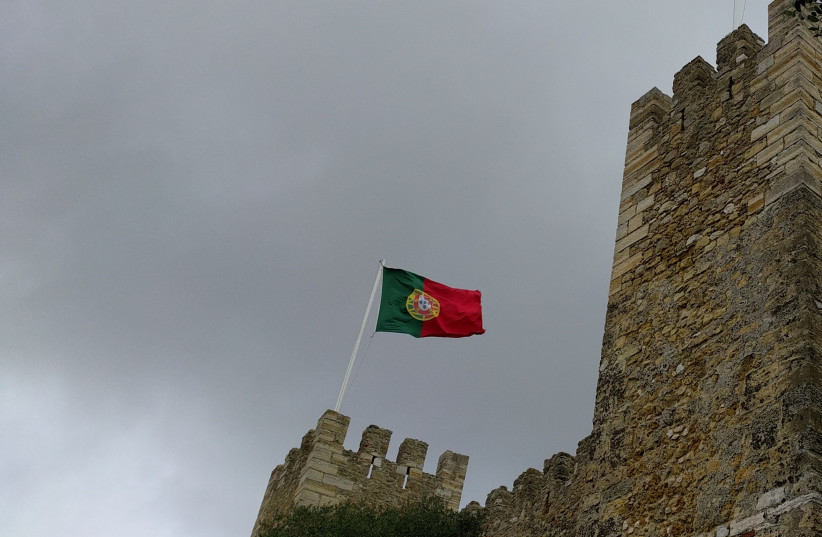It’s not exactly a coals to Newcastle scenario, but not far off it. Gal Tamir, an Israeli singer with a pre-state Palestine-born mother and a father with Hungarian roots, lives in Portugal and makes a living mostly singing fado material.
Fado can be loosely described as Portuguese blues, although that refers more to the mournful content than what most of us identify as “the blues”, from Chicago or the deep south of the US. Fado songs, typically, depict characters from the unsunny side of the street, as well as wistful melancholy airs about longing for someone or somewhere that lies across the sea.
But there is much more to Tamir’s artistic spread, as the members of the audience on the second day of this year’s Jewish Music Days Festival, curated by Dr. Yuval Rabin at the Music Department of Bar Ilan University (May 15-17), will witness with their ears and eyes.
Tamir is coming over together with the Portugal-based Israeli-Portuguese Al’Fado band, predominantly to perform Ladino material, with some fado interwoven and a sprinkling of other genres and styles. While, as the group’s moniker intimates, fado is the principal avenue of stylistic expression, there are all sorts of nuances and colors to the quartet.
A solid musical foundation
The vocalist obtained a solid musical foundation, across a broad range of areas, long before he moved to Portugal and began getting into fado and Ladino. The latter refers to the Judeo-Spanish language and culture of the global Sephardic diaspora, which Spanish and Portuguese Jews took with them to foreign climes, after their expulsion from their Iberian homelands in the late 15th century.
Tamir accrued some valuable professional experience across different areas of the music sector. “I worked as a professional singer in Israel. That was at the same time as working in production and as an artistic director,” he recalls. “That was mostly in contemporary Israeli music, a bit of jazz, and I also did quite a lot of work, both as a producer and as a singer, with the Israel Sinfionetta Beersheva.”
That was all fine and dandy but Tamir began to get itchy feet. “I felt I needed a change of direction. I didn’t really know what I was going to do, but I knew I needed to be somewhere else.”
“I started with six months in Brazil. I set out on a sort of alternative search for something.”
Gal Tamir
SOUTH AMERICA was the first stop in Tamir’s new loose plan of action. “I started with six months in Brazil. I set out on a sort of alternative search for something.” That “something” took a while to emerge as the singer engaged in a motley spread of voluntary positions, including agriculture, working at hostels and teaching English.
However, he never let his musical guard down and he gradually began to imbibe the sounds of various local genres, such as choro and bossa nova. He didn’t exactly start from scratch. “Of course I knew some Brazilian songs, in Hebrew, from Israel and that helped me gain proficiency in Portuguese,” he recalls. The likes of Mati Caspi, Yehudit Ravitz and The Parvarim rode the tidal wave of Brazilian music here in the 1970s and 1980s.
Music aside, Tamir didn’t find his place in Brazil and, after some more globetrotting, eventually decided to relocate once more. Portugal beckoned, and having mastered the local language, albeit the Brazilian dialect, certainly, helped the singer make some headway in the Portuguese musical community.
That’s where his musical die was cast, and he was soon lured by the emotive spirit and sounds of fado and Ladino. “I started that from scratch, in Portugal,” says Tamir. That was prompted by a virtual encounter with another Israeli musician who was already living there.
“I hadn’t performed Ladino music beforehand. That was a suggestion by the bass player in the group, Avishai Back, whom I came across on Facebook,” Tamir chuckles. “He noticed there was a musician in the Israelis in Portugal Facebook group. He contacted me and said, I’m also a musician. I also live in Portugal. Maybe we should meet up.” And the rest is ongoing, mellifluous, melodic, harmonious, artistic history which will resonate at Bar Ilan University next week.
Once they had set their sights on the new project, Tamir began to research the topic, and to try to find a link to the glorious past of the Portuguese Jewish community, and its musical backdrop. “I thought I might be able to find some Ladino songs which came from the traditions of Portugal and Spain.”
To that end he got himself over to Belmonte, home to the oldest Jewish community in Portugal which began life in the 12th century and survived the Inquisition as anusim, continuing to practice Judaism in secret while openly adhering to a Christian way of life.
If Tamir was hoping to find a direct link to the source of the centuries-old music, he was to be disappointed. “I spoke to the community heads there and asked them if they knew any Ladino songs from way back, but they told me that nothing had been written down because their ancestors were afraid the Inquisition authorities would discover they were still practicing Judaism. The whole way of Jewish life was passed down orally.” That, sadly, did not include music.
Still, Tamir and Back managed to lay their hands on a significant chunk of Ladino material, some of which they will play at the university, in their own singular way. Purists in the audience, says Tamir, might be surprised by what they will hear.
“We are a sort of mish-mash of all kinds of influences,” he explains. “We take the songs from the Ladino heritage as our base. But, from a musical perspective, we offer readings that feed off our own musical influences which are very varied.
Elsewhere over the three days there will be workshops, free lectures and live music from an eclectic arc of genres and styles, including liturgical music from India, Syria, Europe and Israel, Middle Eastern music, klezmer, and Ladino music from the Balkans to Morocco.
For tickets and more information: https://www.goshow.co.il/pages/minisite/232













